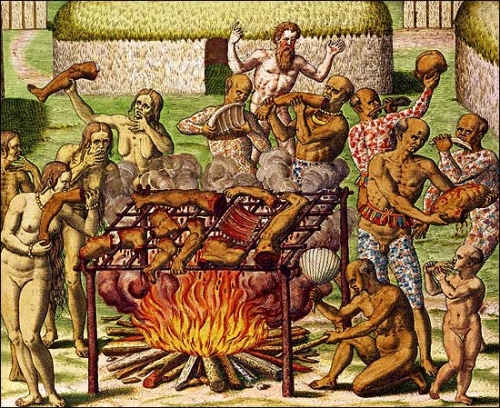dimanche, 21 juin 2020
Cannibalism And Child Sacrifice Are Obvious Evils. Why Can’t Cultural Relativists Admit That?

Cannibalism And Child Sacrifice Are Obvious Evils. Why Can’t Cultural Relativists Admit That?
The recent unearthing of the remains of sacrificed children in Peru highlights the widely known but little discussed topic of human sacrifice and cannibalism — especially of children — among native populations of the Americas.
This latest find is not unique. Evidence shows that humans were butchered and de-fleshed in the Nanchoc Valley, and at the Pyramid of the Moon, in the Moche River Valley, at the Piramide Mayor at Caral and at the Cave of the Owl in the Peruvian Upper Montaña. Human bones, charred and often shattered to extract the marrow, have been found at Los Gavilanes, Huaca Prieta, Asia, and Aspero — to name but a few places.
Further, the curious study of paleofeces, where coprolite (naturally preserved feces) is studied to determine the food available to ancient populations, shows the presence of human proteins, which can only come from consuming human flesh. Fecal samples are taken from various sites throughout the Americas.
Peru also preserves the earliest evidence of headhunting in all the three native cultures (the Paracas, the Nazca and the Huari). Given the dry climate, well-preserved heads have been found which show the process of ritual mutilation (the brain was removed through a hole in the forehead and the lips were sealed shut by two thorns). A similar practice existed among the Jibaro of Puerto Rico.

Nor is Peru unique in the practice of human sacrifice and cannibalism, for both were important features in all native cultures, throughout North, Middle and South America. Take for example, the Tiwanaku in Bolivia; the Tupi-Guarani of Brazil; the gathering of Inca children (usually little girls) as tax payment who were then sacrificed.
The Aztec cooked the flesh of victims into a stew, with tomatoes and peppers. We also have the finds at Ecatepec, near Mexico City, at Tula, at Burnt Mesa, New Mexico, at the Mancos Canyon, the Atakapa of Southwestern Louisiana, among the Tupinamba, and the Carib (the very term “cannibal” comes from the name of this tribe, whom Columbus first encountered).
Further North, there are the elaborate torture-slaughter-cannibal rituals of the Iroquois, the Huron, and other people of the Great Lakes, the Westo, the Anasazi, the plains, the Atlantic and the Pacific coasts (such as the Kwakiutl), the Pacific Islands, and even up into the Arctic, as at the Saunuktuk site. I have been privately assured by scholars who study the Pre-Contact period (before contact with Europeans) that “you wouldn’t want to be living in most parts of the Americas back then.”
This glut of evidence is processed in the mill of relativism, however, and what emerges is the intellectualization of man’s inhumanity to man, which passes for scholarly neutrality. In other words, no one can bring himself to say that one culture can be better than another, especially if that other happens to be the Western one. The exhortation is always the same: We must understand, not judge. But how do you understand children being tortured, slaughtered and then eaten? More importantly, what is there to understand?
Cultures veer into all kinds of horror shows because of weird ideologies they suddenly adopt. This usually means wholesale slaughter of the innocent. Real human beings are brutalized in order to demonstrate the worthiness of ideology. Examples in very recent human history abound: Stalinism, Nazism, Maoism, Islamism and the Armenian genocide by the Turks.
Neutrality in intellectual inquiry is another liberal confusion about the purpose of education. How can you learn anything without judgment? Philosophy shows that neutrality is an illusion (as Joseph Raz clearly demonstrates). What you have instead are choices; and you must commit your allegiance to one — and sometimes more — of these choices. Such is the progress of thought.
Those that study Pre-Contact cultures are themselves not neutral. Thave an agenda — to show how Europeans destroyed what they found.
These same “neutral” scholars also often rationalize human sacrifice and cannibalism by invoking cruelties perpetrated by European colonialists. This is simply more confusion. No one says that humans can’t be cruel, but what history does show is that this cruelty must be contained and destroyed by good ideas. More importantly, Europe of the 15th century — and later centuries — had no entrenched tradition of human sacrifice and cannibalism.

This, then, leads to the broader, yet mindless, assertion: “Who are we to say that cannibalism is bad?” To be fair, such liberal reasoning has given us, in our time, both human sacrifice and a type of cannibalism in the practice of abortion, where the fetus is killed in the womb (to placate the ideology that it’s not really human and some notion of freedom, aka, “free choice”), and then its body is put to many uses (rather lucrative ones). Such are our ideological prisons.
Likewise, the populations of the Pre-Contact Americas were trapped by ideology that transformed humans into the eaters and the eaten. It would require the input of good Western ideas to free these people from the cruel prison of their failed cultures.
This is what history is all about: the sharing of good ideas and the building of a good civilization. Together they provide the good life, which is the chief end of humanity.
Nirmal Dass is a former university professor specializing in the Early and High Middle Ages. His areas of research are philosophy, history and ancient languages. He has written several books and is actively engaged in literary translation.
The views and opinions expressed in this commentary are those of the author and do not reflect the official position of The Daily Caller.
10:12 Publié dans Actualité, anthropologie | Lien permanent | Commentaires (0) | Tags : cannibalisme, infanticide, sacrifice d'enfants, relativisme culturel, philosophie |  |
|  del.icio.us |
del.icio.us |  |
|  Digg |
Digg | ![]() Facebook
Facebook
mardi, 22 février 2011
Multiculturalism is Dead - Where Do We Bury the Body?
Multiculturalism is Dead – Where Do We Bury the Body?
By Jim GOAD
 I’ll never forget a painting I saw at a West Berlin youth hostel in 1985. The background depicted bombed-out ruins, presumably Dresden after the Allied firestorm. In the foreground were two women, their backs to us as they faced the charred, blown-out buildings. One woman was starting to lift her arm in a Sieg Heil salute, while the other rushed to grab her arm and stop her.
I’ll never forget a painting I saw at a West Berlin youth hostel in 1985. The background depicted bombed-out ruins, presumably Dresden after the Allied firestorm. In the foreground were two women, their backs to us as they faced the charred, blown-out buildings. One woman was starting to lift her arm in a Sieg Heil salute, while the other rushed to grab her arm and stop her.
What a weird image it was, mixing national pride with national defeat and national self-loathing.
After World War II ended, no nation on Earth has been force-fed as many Guilt Sandwiches as the Germans, despite the fact that they’d lost seven to nine million of their own Volk in that conflict. One never hears about “the nine million.” It’s nearly verboten to even mention them.
When I saw that painting in 1985, Germany had already endured four decades of post-WWII shaming. Despite all that, I knew that sooner or later, that one lady would tire of holding down the other lady’s arm.
Sixty-five years after World War II’s end, Germany is finally becoming OK with being German again. On October 16 while addressing her Christian Democratic Union party, German Chancellor Angela Merkel said:
In Frankfurt am Main, two out of three children under the age of five have an immigrant background.…This multicultural approach, saying that we simply live side by side and are happy about each other, this approach has failed, utterly failed.
Loud applause greeted that last sentence.
For five years running, the stout, doughy Merkel has been Nummer Eins on Forbes magazine’s list of “The World’s Most Powerful Women,” so her statement is no small potatoes. But only a month earlier, Merkel was telling Germans that they should get used to seeing more mosques in their country. She was also condemning Thilo Sarrazin’s “absurd, insane opinions” as expressed in his shockingly popular book Germany Abolishes Itself.
It’s unclear why Merkel has suddenly shifted her ample hips rightward. She could be responding to recent polls showing that six in ten Germans would like to see Islam restricted, three in ten say they feel their country is “overrun by foreigners,” seventeen percent say that Jews have an undue influence over German affairs [oops!], and thirteen percent say they’d welcome a new Führer [now hold it right there!].
There go those pesky Germans again, refusing to hate themselves. How dare a German say anything besides “I’m sorry” for the next thousand years?
I don’t see the upside to our newer, more multicultural America. The only thing we share is the currency, and maybe that was the point all along.
Everyone expected the Germans to get an attitude sooner or later—after all, they’re the Germans. What seems more troubling, at least to the sworn enemies of All Things European, is that all of Europe seems to be getting the same attitude simultaneously.
What one might refer to as indigenous Europeans—you know, the palefaces, the Ice People, the Ghost Men, the Evil Aryans, the Abominable Snowmen—are beginning to chafe at the iron rainbow to which they’ve been yoked since World War II. Geert Wilders has blossomed into a political force solely by promising to protect Dutch culture from Islamofascism. An anti-immigration party just placed twenty anti-immigration asses into the Swedish Parliament’s seats. France is goin’ wild banning burqas and sending the Roma packing. The Swiss have flipped the bird at minarets. Putin’s brand of post-Soviet Russian nationalism is insanely popular, at least among insane Russians.
Even in the self-loathing, culturally obsequious, crushed-and-bleeding former empire that is the UK, comments in response to Merkel’s proclamation were lopsidedly in favor of what she said. Most of the anonymous online whisperers, presumably British nationals, agreed that multiculturalism was a colossal failure in their country as well.
Reading the comments, I saw parallels between Europe’s brand of “multiculturalism” and the American product. Both hither and yon, there’s anger about racial job quotas, oppressive speech codes, and double standards regarding who’s allowed to show ethnic pride.
What’s important is the way multikulti has unfolded and where. You don’t see such sensitivity training being forced upon anyone in Africa, Asia, the Middle East, or South America. You don’t hear China, Japan, or Israel being lectured to swing open their doors to foreigners. Almost exclusively, multiculturalism is a psychological marketing program designed for majority-white countries. Often, it is sold with the idea that whites are paying a historic debt, are reaping what they’ve sown, that what goes around comes around, that the wheel has turned full-circle, the chickens are coming home to roost, and that it’s time to pay the swarthy piper his due.
Country by country, continent by continent, there’s a sense that the newer, darker arrivals are receiving preferential treatment over those who’ve been there for generations. In the UK, it’s called “Positive Discrimination.” In America, it’s called “affirmative action” and “amnesty.” And across every border where whites are a majority, there’s a creeping sense that politicians don’t give a fuck about how they feel. They never asked for these new waves of immigrants, and they had no choice in this odd social-engineering experiment that’s demolishing whatever they used to share as a common culture.
Suddenly, this doesn’t seem so much like a celebration of all cultures as it does punishment of a specific culture. And that doesn’t sound like such a swell recipe for having everyone get along.
We’ll be continually reminded that European satellite nations such as Canada, the USA, and Australia were settled atop indigenous skulls, so the land-grabbing descendants of those race-murderers have no right to whine about being gradually wiped out themselves by newcomers.
Once again, for Christ’s sake, whether he’s dead or alive: Two wrongs don’t make a right. If colonialism was wrong then, it’s wrong now. Multiculturalism is merely colonialism with a prettier name. I realize and concede the fact that it awards us with a dazzling array of ethnic restaurants unparalleled in their tastiness.
Under multiculturalism, we have a wider selection of food…and no one talks to anyone anymore. Many of us now speak different languages and wouldn’t even know how to talk to one another. Rather than erasing borders, multiculturalism has merely created new borders within borders. Rather than destroying nationalism, it creates mini-nations within nations.
If we’re going to push multiculturalism’s glories, shouldn’t we point out where has it worked in the past? If diversity is a strength, why did stretched-too-thin empires such as ancient Rome and the Soviet Union eventually fall from the weight of their own diversity?
Stop calling me a racist and shoot some believable answers at me. I really want to hear them.
As always, the “chattering classes” are working out their postcolonial guilt complexes at the lower classes’ expense. Either they’ve known what they were doing all along or they haven’t, and I’m not sure which is worse.
It’s dangerous to ignore the fact that all the technology in the world, the ceaseless multicultural brainwashing that’s been laser-beamed into our eyeballs over the past 65 years, has not eradicated the basic human tendency to be tribal. If they didn’t fully murder such instincts in the Germans—and God fucking knows they tried hard with the Germans—maybe such instincts can’t be killed.
Yes, I realize we’re all human. If that’s your point, you’ve already made it—and, I might add, at a tremendous expense. What you fail to realize is that humans tend to be tribal. And if you get too many tribes, you don’t have a nation anymore.
I guess we should celebrate the fact that even though no one speaks to one another anymore, at least the people who aren’t speaking to one another are more “multicultural” than they used to be back when people actually spoke to one another.
What kind of newly enriched and suddenly empowered American culture do I see when I drive on the highway near my house? I see Wal-Mart, Chili’s, Motel 6, Wendy’s, and Home Depot. It could be Indianapolis. It could be Omaha. It could be Seattle. It could be anywhere in America. It happens to be Stone Mountain, GA, but you’d have no idea you were even in the South. In 2010, the only cultural landscape we share consists of familiar corporate logos. There’s no local flavor, no sense of indigenous culture. Things don’t seem richer, livelier, and more colorful; they’re empty, listless, and dead.
At least that’s how it feels to me. I don’t feel as if there’s any glue, cohesion, or sense of belonging in this society anymore. I’m feeling the anomie something awful. I don’t see the upside to our newer, more multicultural America. The only thing we share is the currency, and maybe that was the point all along.
Multiculturalism has failed, but it has only begun to fail. Now what? After constant states of flux, our society now seems fluxed-up beyond repair. How do we sort out the mess while avoiding more Trails of Tears?
Multiculturalism is dead, sure, but what do we do with the body? I’ve yet to hear a good burial plan, and I fear we may need one.
And what makes me most nervous is that I’m not even sure who “we” are.
00:20 Publié dans Actualité, Philosophie, Réflexions personnelles | Lien permanent | Commentaires (0) | Tags : multiculturalisme, multiculture, relativisme culturel, philosophie, sociologie, actualité, problèmes contemporains |  |
|  del.icio.us |
del.icio.us |  |
|  Digg |
Digg | ![]() Facebook
Facebook
dimanche, 20 février 2011
Kein Kulturrelativismus!

Kein Kulturrelativismus!
Götz KUBITSCHEK - http://www.sezession.de/
In der FAZ von heute warnt die Soziologin Necla Kelek zwei Zeitungsspalten lang vor dem Kulturrelativismus der Justizministerin Leutheusser-Schnarrenberger. Sie biedere sich den Muslimverbänden auf doppelte Weise an:
Zum einen wiederhole sie den alten Zopf, daß alle Religionen dieselben universellen Prinzipien verträten, und zwar ungeachtet ihrer institutionellen und somit geschichtlichen Entwicklung. Leutheusser-Schnarrenberger ignoriere dadurch etwa die Tatsache, daß der Islam bisher nirgendwo bereit sei, Religion und Politik zu trennen: Die Politik sei selbst nach gemäßigter islamischer Auffassung weiterhin den Glaubenssätzen untergeordnet. Das Christentum hingegen habe im Vergleich dazu seine Säkularisierung längst hinter sich.
Der Kulturrelativismus werde, so Kelek, noch deutlicher, wo die Justizministerin den Eindruck vermittle, „Grundgesetz und Scharia seinen nur unterschiedliche Möglichkeiten, Recht zu sprechen“ (wobei Leutheusser-Schnarrenberger das „vorurteilsbeladene“ Wort Scharia konsequent vermeide). Es gibt da also keine Wertung, keine Ablehnung einer den Deutschen wesensfremden und ihrem geschichtlichen Weg nicht angemessenen Religion und religiösen Praxis und Rechtssprechung: Stattdessen Relativierung als Ausdruck einer — Kapitulation vor der Macht des Faktischen? Oder als Ausfluß einer tiefen inneren Ablehnung des Eigenen, des So-Seins? Einer Hoffnung auf Befreiung vom Wir?
Joschka Fischer hat solches in seinem Buch Risiko Deutschland ja schon vor zehn Jahren programmatisch auf den Punkt gebracht: Deutschland müsse von außen eingehegt und von innen durch Zustrom heterogenisiert, quasi „verdünnt“ werden. Leutheusser-Schnarrenbergers Kulturrelativismus ist – nach der bereits erfolgten Bevölkerungsheterogenisierung – ein Meilenstein auf dem Weg einer Rechts- und Institutionenheterogenisierung.
Das ist ein Angriff auf so ziemlich das letzte, was noch „Mark in den Knochen“ hat: Wo wir nämlich der Willens- und Schicksalsgemeinschaft schon seit langem entbehren, haben wir doch noch eine Rechtsgemeinschaft. Das ist eine Schwundstufe zwar im Vergleich zu dem, was einmal war, aber es ist viel, wenn man sich die Alternbativen ausmalte: uns nicht gemäßes Recht.
Im Zusammenhang mit Keleks Artikel in der heutigen FAZ sei auf das Themenheft „Islam“ der Sezession verwiesen, es sollte heute und morgen bei den Abonnenten eintreffen. Von Kulturrelativismus findet sich darin nicht viel, einiges aber vom Selbstbewußtsein, mit dem man der ebenso religiös wie institutionell dämmernden Überfremdung entgegentreten kann.
Den Inhalt des Heftes kann man hier einsehen.
00:20 Publié dans Actualité, Philosophie, Sociologie | Lien permanent | Commentaires (0) | Tags : sociologie, relativisme, relativisme culturel, multiculture, multiculuralisme, réflexions personnelles, allemagne, philosophie, problèmes contemporains |  |
|  del.icio.us |
del.icio.us |  |
|  Digg |
Digg | ![]() Facebook
Facebook


